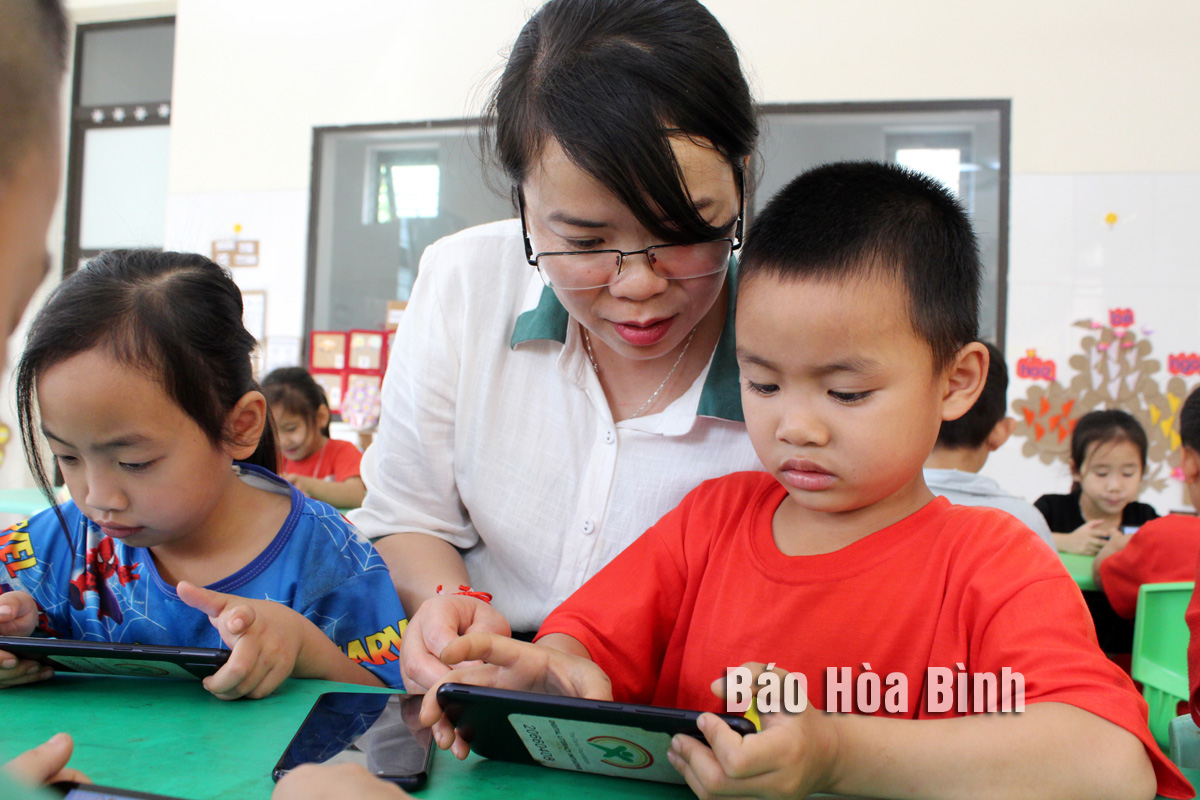
Despite being situated in remote and underprivileged areas, schools like Tan Dan Kindergarten in Tan Thanh commune, Mai Chau district, have reaped the benefits of digital transformation tools and applications, thanks to support from the education and training sector.

Thanks to new learning methods,
students of Tan Dan Kindergarten, Tan Thanh commune, Mai Chau district, have
enhanced their critical thinking and creativity through the use of
"Language Programming" app.
Principal Ha Thi My highlighted that in recent
years, the school has received substantial support from the education sector
and related organisations. This includes investments in programmes integrating
information technology and digital transformation into educational activities.
One standout initiative was the provision of 25 smart devices, enabling the use
of the "Language Programming" app for preschoolers. This innovative
approach has successfully nurtured creativity and critical thinking among them.
Additionally, the school’s staff and teachers have
embraced advanced IT systems for management and professional tasks, leading to
noticeable improvements in administrative efficiency and teaching quality.
Yen Hoa Primary and Secondary School, also located in a disadvantaged area, has
consistently excelled in fulfilling its educational mission. Principal Tran
Tuan Vang noted that for the 2024–2025 academic year, all teachers at the
school hold associate’s degree or higher credentials, with over 30% possessing
bachelor’s degrees and demonstrating strong professional expertise. This solid
foundation has paved the way for the integration of IT and digital
transformation in management and teaching. Supported by modern equipment, the
school has shifted from traditional teaching methods to active learning
approaches, allowing both teachers and students to cultivate critical thinking,
creativity, and proactivity. These advancements contribute to the all-round
development of students.
According to Nguyen Quang Minh, Deputy Director of
the provincial Department of Education and Training (DoET), the education
sector is undergoing a comprehensive digital transformation to enhance
management efficiency and education quality.
In collaboration with IT service providers, the DoET
has established the Hoa Binh education database and a smart education
ecosystem, which are fully updated and interconnected with the national
education database. Currently, data for 98.4% of students, school staffs, and
teachers in the province has been integrated with the national population
database.
The education sector has also introduced the eNetViet app to connect families
and schools, digitised school records, and implemented digital libraries. These
initiatives are part of the smart education ecosystem, significantly reducing
administrative workloads for schools and teachers. Additionally, university and
college admissions for 2023 and 2024 were conducted entirely online through the
public service portal.
The DoET has piloted electronic student records for primary school students,
achieving a 99.34% completion rate for records of first to fourth-grade
students. Remaining records are being reviewed and updated.
As part of the province’s plan under the "Cashless Payment Development
Scheme for 2020–2025," the DoET collaborated with MISA JSC and commercial
banks to establish a cashless payment platform for tuition fees and other
expenses. By December 8, 2024, nearly 83.7 billion VND (approximately 3.3
million USD) in fees had been processed through this system.
Minh emphasised that digital transformation efforts have significantly enhanced
teaching quality while saving time in educational and administrative processes.
The transition from traditional methods to technology-driven approaches has
empowered educators and students alike to think critically, innovate, and
actively engage in the learning process. These initiatives have bolstered
efficiency and effectiveness across the education sector.
The emulation movement "Hoa Binh joining hands to build new-style rural areas” has been widely spreading, becoming a driving force that motivates the localities to renew rural landscapes and improve the material and spiritual lives of the residents. In this movement, the people play a central role-both as the main implementers and direct beneficiaries of its outcomes.
In response to the global digital revolution, Hoa Binh Newspaper is transforming itself into a modern and multi-platform media hub, blending cutting-edge technology with a restructured newsroom and a new generation of tech-savvy journalists.
Hoa Binh province’s Association of the Elderly recently held a conference to review the project on expanding the inter-generation self-help club model until 2025.
In a move to implement Resolution No. 57-NQ/TW, issued on December 22, 2024 by the Politburo, which targets breakthroughs in science-technology development, innovation, and digital transformation, the Hoa Binh provincial Department of Health has issued a plan to roll out the "Digital Literacy for All” campaign within the local health sector.
An Nghia Commune (Lạc Sơn District) is one of the communes that achieved the tha standard of the national new rural area in 2018. Entering a new development phase, the commune is now trying to meet the criteria for the advanced new rural development. With the strong political will and the public consensus, the commune is gradually overcoming the challenges to reach this goal, aiming for the sustainable development.



